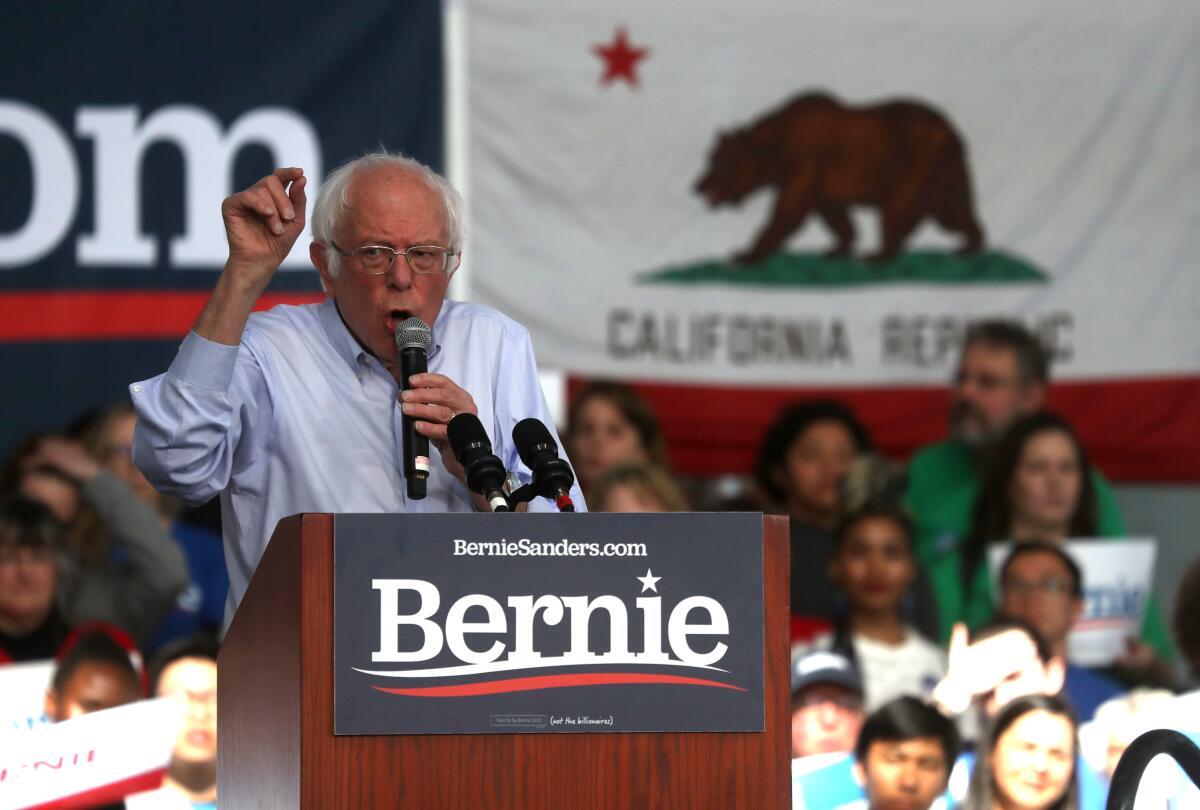What’s the matter with Bernie Sanders? A lot

Good morning. I’m Paul Thornton, and it is Saturday, March 1 — er, I mean, Saturday, Feb. 29. Let’s take a look back at the week in Opinion.
Some of the readers who harangue me about fixating on President Trump week in and week out (he’s the president, and he’s terrible at it, so what do you expect?) might find something to like in this newsletter, for it expresses reservations about one of the president’s favorite targets. Sen. Bernie Sanders, the non-Democrat from Vermont seeking the presidential nomination of the Democratic Party, will likely win the California primary in a landslide on Super Tuesday and appears to have the best shot at garnering enough delegates to face Trump in November.
A cure for the common opinion
Get thought-provoking perspectives with our weekly newsletter.
You may occasionally receive promotional content from the Los Angeles Times.
This unnerves me, and not because of Sanders’ purported socialism (memo: he is almost certainly not a socialist) or because of any concerns over his purported lack of electability — an odd objection coming from candidates who have yet to beat him in, you know, an election. In fact, I don’t look forward to a Sanders administration for the same reason I wouldn’t want to live under a Michael Bloomberg presidency: Both candidates have a troubling view of federal power in which constitutional limits are rendered irrelevant by their policy aims.
(Of course, none of this means I wouldn’t vote for Sanders in November. Of course I would — a second term for Trump would be unacceptable, and there’s no evidence that Sanders is in this for himself the same way our current president is.)
Jon Healey, the L.A. Times’ deputy editorial page editor, explained this objection to Sanders in a piece prodding Democrats to sharpen their attacks on him:
“There’s no need to get down in the policy weeds with Sanders. The questions that need to be asked, pointedly and often, are much more fundamental.
“First and most important, they need to ask him to define what Washington could and could not do under a Sanders administration, because his platform suggests no limit to the government’s power in many areas. (The main exceptions are in the government’s power to enforce criminal statutes and police the border.) Obliterate the health insurance industry? Sure! Give away electric cars? Of course! Stop all coal and gas extraction on federal lands and kneecap the domestic energy industry by banning fracking? With a snap of the fingers! Use trillions of federal tax dollars to build housing? Why not? Guarantee everyone a job? It’s about time!
“His proposals, if adopted, would result in a breathtaking federal intrusion into markets, substituting Washington’s priorities and federal taxpayers’ money for the choices that businesses and consumers have long been making themselves.”
Actually, Sanders can save the Democratic Party. The PTSD from George McGovern’s landslide defeat drove the party of Bill Clinton to the right; in fact, it’s drifted to the right of American public opinion, which happens to align more closely with Sanders, writes columnist Robin Abcarian. Voter concern with soaring income inequality has fueled Sanders’ rise, says Danny Feingold. Columnist Jonah Goldberg warns that Sanders’ rise bears a troubling resemblance to a certain Republican’s ascent in 2016.
You read it in the L.A. Times: Joe Biden, Michael Bloomberg and Sanders are “geezers.” Virginia Heffernan’s hot take on the Democrats’ debate in South Carolina didn’t sit well with readers, who faulted the columnist for espousing ageism and even misunderstanding when the candidates’ mothers were born. Wrote Heffernan: “The stumbles that mark these three men as holdovers rather than visionaries might be endearing in less perilous times. But we already have a kitsch geezer president — and, as America now knows, the joke wears off quickly.” L.A. Times
You probably didn’t hear about a mass shooting this week, which in this country doesn’t mean there wasn’t one. Brian A. Boyle, an alumnus of Marquette University, laments that the shooting deaths of five people at the Molson Coors factory in Milwaukee “hit a little too close to home for me.” Troublingly, Boyle notes that he searched in vain for timely breaking news updates and tweets about the shooting, evidence that “this tragedy barely pierced the mass consciousness.” L.A. Times
Enjoying this newsletter? Consider subscribing to the Los Angeles Times
Your support helps us deliver the news that matters most. Become a subscriber.
Is an L.A. City Council candidate a socialist and a right-winger? Of course not, but someone is smearing Loraine Lundquist as both a “loyal” Republican and an “extremist” who wants to raise property taxes and force people to buy electric cars, editorial writer Kerry Cavanaugh writes. “Just as galling, the polar-opposite portrayals of Lundquist come from the same group: Working Californians, the political arm of the union that represents Los Angeles Department of Water and Power employees.” L.A. Times
Michael Bloomberg is nothing like Donald Trump. Both are billionaires (although really, Bloomberg’s limitless wealth dwarfs Trump’s), but that’s where the similarities end. Roger Lowenstein notes that among the differences between the two — the former New York mayor is a serious philanthropist who supports a wealth tax — is a crucial one: “Bloomberg, a bookkeeper’s son, is self-made. Trump was staked to millions by his father, Fred Trump, and repeatedly bailed out by Daddy when he blew his wad.” L.A. Times
Stay in touch.
If you’ve made it this far, you’re the kind of reader who’d benefit from subscribing to our other newsletters and to the Times.
As always, you can share your feedback by emailing me at paul.thornton@latimes.com.
A cure for the common opinion
Get thought-provoking perspectives with our weekly newsletter.
You may occasionally receive promotional content from the Los Angeles Times.




